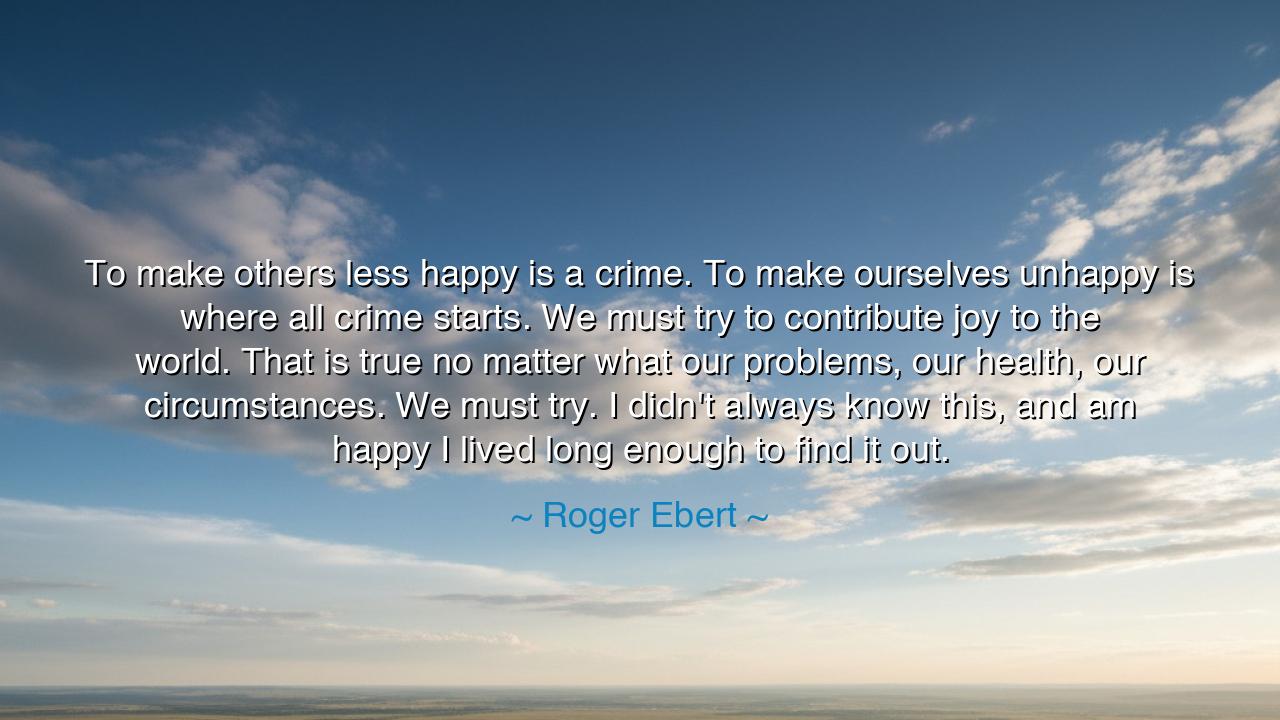
To make others less happy is a crime. To make ourselves unhappy
To make others less happy is a crime. To make ourselves unhappy is where all crime starts. We must try to contribute joy to the world. That is true no matter what our problems, our health, our circumstances. We must try. I didn't always know this, and am happy I lived long enough to find it out.






The words of Roger Ebert, “To make others less happy is a crime. To make ourselves unhappy is where all crime starts. We must try to contribute joy to the world...” stand as one of the final and most luminous reflections of a man who had lived, suffered, and awakened to the highest wisdom. Ebert, who spent much of his later life in physical silence after losing his voice to cancer, spoke instead through the voice of his spirit. In this truth, he declared that happiness is not a reward—it is a moral duty, and that the cultivation of joy, both in ourselves and in others, is the most sacred work of the human soul.
When Ebert wrote these words, he was already living in the shadow of death. Yet from within his suffering came this radiant understanding: that to spread sorrow, bitterness, or cruelty is to poison the very fabric of life; but even more tragically, to harbor unhappiness within oneself is to give birth to that poison in secret. He had discovered that every external act of evil originates from an inner discontent—a heart that has forgotten how to be grateful, a spirit that has ceased to love. All crime begins where joy ends.
History is filled with those who proved this truth. Think of Viktor Frankl, the psychiatrist and Holocaust survivor who, in the darkest of camps, found meaning through hope. Amid starvation and cruelty, Frankl saw men lose their humanity when despair conquered them—but he also witnessed others, though weak and dying, give away their last piece of bread. They had mastered what Ebert later understood: that joy is not the absence of pain, but the triumph of the spirit over pain. Those who guard their joy become the guardians of goodness itself.
To Ebert, happiness was not a privilege of circumstance but a discipline of the soul. He confessed, “I didn’t always know this,” acknowledging his own transformation from the pursuit of pleasure to the pursuit of meaning. His realization came through suffering, as many timeless truths do. When he could no longer speak, eat, or work as before, he discovered a deeper form of existence—one where gratitude and wonder became the voice of the heart. His final years were his most luminous, not because they were easy, but because he had learned to contribute joy despite pain.
This teaching carries the tone of the ancients: if every person is a spark of the divine, then to dim another’s light—or to dim our own—is a wound upon creation itself. Each unkind word, each act of selfishness, is a shadow cast upon the collective soul. And yet, each smile, each gesture of kindness, each moment of beauty offered freely, restores the world’s balance. Ebert’s philosophy is not naïve optimism; it is moral heroism—the courage to bring warmth into a cold world.
The lesson is clear: guard your happiness as you would your life, for from it flows your power to heal others. Do not surrender your joy to anger, envy, or despair, for these are thieves that hollow the heart. When you rise in the morning, ask not what the world owes you, but what measure of light you can add to it. When pain visits, do not let it steal your gentleness. When sorrow comes, let it refine your compassion.
And so, remember these words as an inheritance for your soul: Joy is the foundation of virtue. To live joyfully is to live rightly. If you cannot change the world, change the atmosphere around you. Offer a kind word. Forgive. Smile where silence would suffice. In the vast struggle of existence, even a single act of joy—like a candle in darkness—can remind the world that love still endures.
Thus, let this be passed down as ancient counsel: to bring joy is to serve life itself. For when we choose joy, we choose creation over destruction, healing over harm, and hope over despair. In that choice, every soul becomes divine.






AAdministratorAdministrator
Welcome, honored guests. Please leave a comment, we will respond soon